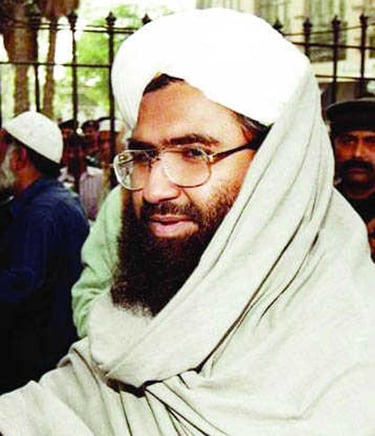Jaish Commander Reveals Pakistan Army’s Role: General Asim Munir Ordered Officers to Attend Operation Sindoor Funerals
In a major revelation, a Jaish-e-Mohammed commander has exposed the involvement of Pakistan Army in terrorism, alleging that Army Chief General Asim Munir personally instructed senior officers to attend the funerals of militants killed in Operation Sindoor. The disclosure has sparked debate on Pakistan’s covert links with terror outfits.


By: Bharat Daily Samachar Date: 18 Sep,2025
Jaish Commander Reveals Pakistan Army’s Role: General Asim Munir Ordered Officers to Attend Operation Sindoor Funerals
A shocking disclosure has shaken South Asia’s security and political landscape. A commander of the banned terror outfit Jaish-e-Mohammed (JeM) has revealed that Pakistan Army, under the leadership of General Asim Munir, extended open support to militants killed during Operation Sindoor. According to the commander’s claims, the army chief himself directed officers to attend the funerals of slain terrorists, highlighting the depth of the relationship between the Pakistani military and extremist groups.
The Revelation
In an intercepted communication reportedly accessed by intelligence agencies, the Jaish commander accused Pakistan’s military of playing a “double game” — portraying itself as a counter-terrorism ally internationally, while quietly glorifying terrorists at home. The commander disclosed that following the losses suffered in Operation Sindoor, which targeted Jaish hideouts, the Pakistani Army treated the dead militants as “martyrs” and ordered officers to attend their funerals.
The revelation paints a disturbing picture of the Pakistani establishment’s alleged patronage of terrorism. It raises fresh questions about Islamabad’s commitment to fighting extremism, especially at a time when Pakistan’s economy and diplomatic standing are already under pressure.
Operation Sindoor: A Quick Recap
Operation Sindoor, carried out by security forces in recent months, was a decisive strike against Jaish-e-Mohammed and other Pakistan-based terror outfits operating along the border. The operation led to the elimination of several top Jaish operatives and disrupted multiple sleeper cells.
While India hailed the mission as a counter-terrorism success, Pakistan maintained silence publicly. However, the Jaish commander’s claims now suggest that the Pakistani Army did not just mourn the loss of these terrorists but officially honored them.
General Asim Munir Under Spotlight
General Asim Munir, who took charge as Pakistan’s Army Chief in November 2022, has often positioned himself as a strong leader capable of restoring the military’s grip over the nation’s politics. But this revelation puts him in a difficult position.
According to the Jaish commander, General Munir personally ordered officers from different garrisons to attend funerals, to “send a message” of solidarity with militants and their families. Such actions, if true, directly undermine Pakistan’s claims before global forums like the United Nations and Financial Action Task Force (FATF), where it has repeatedly pledged to curb terror financing and support.
International Implications
The revelations could have major international consequences. India has long accused Pakistan of providing safe havens and support to terror groups like Jaish-e-Mohammed, Lashkar-e-Taiba, and Hizbul Mujahideen. This testimony from within Jaish itself strengthens New Delhi’s position on global platforms.
Countries like the United States, France, and the UK, which have pressured Pakistan to dismantle terror networks, may also take note of this disclosure. If verified, it could lead to fresh sanctions, increased diplomatic isolation, and stricter monitoring by FATF.
Pakistan’s “Double Standards”
Security analysts believe this development exposes the long-standing dual policy of Pakistan’s military: presenting itself as a victim of terrorism while using terror groups as “strategic assets” against neighboring countries.
“Pakistan cannot expect the world to believe its narrative of fighting terrorism if its own Army Chief is honoring the dead militants,” said a defense analyst, reacting to the revelation. “This isn’t just hypocrisy — it’s state complicity.”
What It Means for India
For India, the commander’s statement is both alarming and useful. On one hand, it reinforces concerns that Pakistan’s deep state continues to nurture cross-border terrorism. On the other, it gives India stronger diplomatic ammunition to expose Islamabad’s duplicity on the global stage.
Indian security forces are expected to remain vigilant, especially as intelligence inputs suggest that Jaish and other outfits may attempt retaliatory strikes to avenge losses suffered in Operation Sindoor.
Growing Pressure on Islamabad
Domestically, Pakistan is already grappling with political instability, an economic crisis, and public discontent over inflation and unemployment. Now, with its military’s covert support to terrorists being exposed, the government in Islamabad faces an even bigger credibility crisis.
While Pakistan may attempt to dismiss the revelation as propaganda, the fact that it comes directly from a Jaish commander makes it harder to ignore.
Conclusion
The explosive claims made by the Jaish commander have opened up a fresh chapter in the debate over Pakistan’s role in global terrorism. If General Asim Munir indeed ordered officers to attend militant funerals, it underscores the dangerous nexus between the Pakistani military and extremist organizations.
For India and the international community, this revelation serves as another reminder that the fight against terrorism cannot succeed without holding Pakistan accountable.
As the world awaits Islamabad’s response, one thing is clear — the shadow of terrorism continues to haunt Pakistan, and the truth is becoming harder to conceal.
